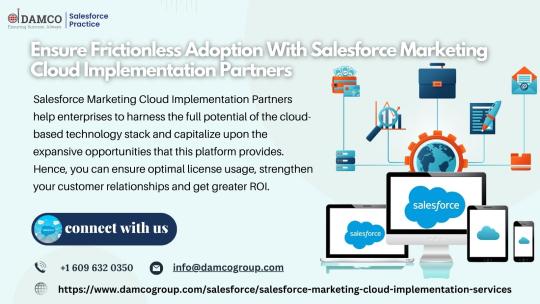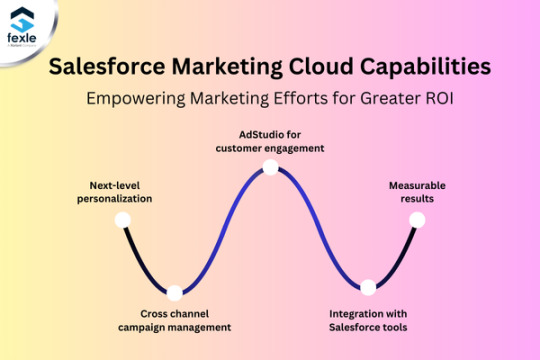#Cloud CRM Market
Explore tagged Tumblr posts
Text
https://www.advancemarketanalytics.com/reports/124363-global-cloud-crm-market
Cloud CRM Market - Big Changes to Have Big Impact
Advance Market Analytics released a new market study on Global Cloud CRM Market Research report which presents a complete assessment of the Market and contains a future trend, current growth factors, attentive opinions, facts, and industry validated market data. The research study provides estimates for Global Cloud CRM Forecast till 2029*.
CRM technology in which the CRM applications, CRM resources, and the organization's customer data reside in the cloud and are distributed to end-users through the Internet is referred to as cloud CRM. Since a growing number of small businesses lack the in-house IT expertise to deploy, maintain, and update an on-premises CRM application, the cloud CRM market is expected to expand in the future. The provider is in charge of maintaining the software, delivering system updates, and dealing with technical problems, bugs, and other issues when they occur with Cloud CRM. It also aids in the incorporation of general office software and email systems, as well as the integration of social data and automated data backups.
Key Players included in the Research Coverage of Cloud CRM Market are:
Salesforce.com, Inc. (United States), Microsoft (United States), ELCA (Switzerland), Oracle Corp. (United States), 1CRM (Canada), SugarCRM Inc. (United States), SAP (Germany), Zendesk Inc. (United States), Zoho (India), Adobe Inc. (United States), Colt Technology Solution (United Kingdom)
What's Trending in Market: The Emergence of AI in Cloud CRM
Challenges: Integration Concerns With Traditional Architectures
Opportunities: Rising Number of Start-Up in Developing Countries Growing Cloud Adoption Across Several Industry Verticals
Market Growth Drivers: Rising Demand for Cloud CRM from the Telecom Sector to Store Data and to Generate Lead Growth in Digitalization and Government Compliances for Non-Profit Organizations
The Global Cloud CRM Market segments and Market Data Break Down by Application (Customer Service and Support, E-commerce, Sales, Marketing), Deployment (SaaS, PaaS, IaaS), End User (Large Enterprises, Small and Medium Enterprises, Government)
Get inside Scoop of the report, request for free sample @: https://www.advancemarketanalytics.com/sample-report/124363-global-cloud-crm-market
To comprehend Global Cloud CRM market dynamics in the world mainly, the worldwide Cloud CRM market is analyzed across major global regions. AMA also provides customized specific regional and country-level reports for the following areas.
• North America: United States, Canada, and Mexico.
• South & Central America: Argentina, Chile, Colombia and Brazil.
• Middle East & Africa: Saudi Arabia, United Arab Emirates, Israel, Turkey, Egypt and South Africa.
• Europe: United Kingdom, France, Italy, Germany, Spain, Belgium, Netherlands and Russia.
• Asia-Pacific: India, China, Japan, South Korea, Indonesia, Malaysia, Singapore, and Australia.
0 notes
Text

Dean Infotech GmbH
Dean Infotech GmbH ist eine in Hamburg ansässige Firma und eine Schwestergesellschaft der Dean Infotech Pvt Ltd. Indien, mit dem Fokus auf die Entwicklung von Software-Lösungen im Bereich Salesforce und Web-Technologien. Unser Ziel ist es, unsere Kunden mit dem besten aus beiden Welten zu begeistern. Zusammen, als hoch motiviertes Team, ist es unsere oberste Priorität, unseren Kunden die richtige Software, verlässlich und mit glänzendem Service anzubieten.
Address- Ballindamm 3, Hamburg, Germany - 20095 Mail- [email protected]
#Salesforce Entwicklungsunternehmen Deutschland#Salesforce Beratungsunternehmen Deutschland#Salesforce Agentur Deutschland#Salesforce Partner Agentur Deutschland#Salesforce Implementierungen Deutschland#Salesforce API Integration Deutschland#Salesforce Daten-Migration Deutschland#Salesforce CRM Deutschland#Salesforce zertifiziertes Beratungsunternehmen#Salesforce zertifizierte Agentur#Salesforce Automatisierung Deutschland#Salesforce App Entwicklung Deutschland#Salesforce Marketing Cloud Entwicklung Deutschland#Salesforce Marketing Cloud Agentur Deutschland
2 notes
·
View notes
Link
Unleash your business potential with Salesforce! Discover the best practices and avoid common pitfalls in maximizing your marketing and sales efforts, all in one comprehensive guide.
#salesforce#crm#salesforceinmplementation#salesforce integration#salesforce partner#cloud#Marketing Cloud#Business#marketing#sales#technology#salesforce solutions#getoncrm
9 notes
·
View notes
Text

Ensure Frictionless Adoption With Salesforce Marketing Cloud Implementation Partners
Salesforce Marketing Cloud Implementation Partners help enterprises to harness the full potential of the cloud-based technology stack and capitalize upon the expansive opportunities that this platform provides. Hence, you can ensure optimal license usage, strengthen your customer relationships and get greater ROI.
#salesforce marketing cloud implementation partners#salesforce marketing cloud consulting#salesforce marketing cloud consultant#salesforce marketing cloud implementation services#salesforce marketing cloud integration#sfdc marketing cloud#certified marketing cloud consultant#salesforce marketing cloud crm integration#salesforce marketing cloud support
1 note
·
View note
Text

Zoho Workplace: What's New in 2025?
Zoho Workplace has solidified its position as a comprehensive business productivity suite, offering robust tools for email management, collaboration, document storage, and real-time communication.
As businesses continue to embrace hybrid and remote work models, Zoho remains committed to improving efficiency, security, and seamless integration within its applications.
In February 2025, Zoho introduced a series of enhancements across its Workplace applications, making email communication smarter, document collaboration smoother, and security measures stronger.
This article explores the latest Zoho Workplace updates, highlighting key features and how businesses can leverage these improvements.
Quick Tip:
Leverage the expertise of Zoho Experts and Zoho Consultants to drive 3x business growth and efficiency. Book your free consultation call NOW!
1. Enhanced Email Management in Zoho Mail

Zoho Mail has introduced new features to streamline email communication and task management. Some of the latest updates include:
Add Emails to To-Do: Users can now convert emails into tasks with a single click, helping teams prioritize and organize work more efficiently.
Restore Bookmarks: Accidentally closed bookmarks in Zoho Mail can now be instantly restored, ensuring users don’t lose important references.
Bulk Email Selection Limit: To enhance performance, Zoho Mail now allows users to select up to 300 email conversations at once for bulk actions.
These features make email management more intuitive and productive, reducing time spent organizing and responding to emails.
2. Strengthened Security Measures

Security remains a top priority for Zoho, and the latest updates include advanced encryption and access control mechanisms:
PGP Key Management Enhancements: Users can now set expiration dates for PGP keys, ensuring better email security and preventing unauthorized access.
Quarantine Admin Role: A new Admin Console feature allows designated users to manage quarantined emails, reducing the risk of phishing attacks and spam infiltration.
With these updates, Zoho Workplace security is stronger than ever, making it a reliable choice for businesses prioritizing data privacy and cybersecurity.
3. Smarter Collaboration with Zoho WorkDrive

Zoho WorkDrive has introduced enhancements to the TrueSync app, optimizing file access and cloud storage solutions:
Improved File Syncing: The latest TrueSync update (Version 3.9.23) includes bug fixes and performance enhancements.
Better Compatibility: The WorkDrive TrueSync app now supports Windows 10 (Version 1809 or later) and macOS 12 and above.
Faster File Access: Users can now access and edit files without excessive load times, even with large file repositories.
These improvements make file sharing and document collaboration seamless, supporting remote and hybrid work environments.
4. Productivity Boost with Zoho Writer and Zoho Sheet

Zoho Writer and Zoho Sheet have received performance and usability enhancements, improving real-time collaboration:
Zoho Writer Updates:
Enhanced AI-powered grammar suggestions for improved document accuracy.
Real-time co-authoring improvements for smoother multi-user editing.
Custom templates to standardize business documents.
Zoho Sheet Enhancements:
New formula functions for advanced data calculations.
Conditional formatting upgrades for better data visualization.
Integration with Zoho Analytics for deeper business insights.
These updates allow teams to collaborate more efficiently while maintaining accuracy in documentation and data processing.
Why These Updates Matter for Businesses

Quick Tip:
Leverage the expertise of Zoho Experts and Zoho Consultants to maximize the potential of Zoho Workplace features to drive 3x business efficiency and growth.
The latest Zoho Workplace updates emphasize:
Better productivity with smart email and task integration.
Enhanced security through stronger encryption and admin controls.
Seamless collaboration with optimized file management and real-time editing tools.
By staying ahead of these Zoho Workplace trends, businesses can enhance efficiency, security, and collaboration across teams.
Final Thoughts: Elevate Your Workflow with Zoho Workplace

Zoho continues to push the boundaries of workplace productivity, ensuring businesses have access to cutting-edge tools for communication, document management, and security.
Whether you're looking to optimize email handling, streamline collaboration, or strengthen security, these updates provide the solutions needed to stay ahead in 2025.
By leveraging Zoho Workplace, businesses can create a more secure, productive, and scalable digital workspace. Stay tuned for more updates as Zoho continues to innovate in the digital workplace landscape.
Ready to upgrade your Zoho experience? Evoluz Global Solutions drive 3x business growth and efficiecy with tailored Zoho Solutions.
Book your free consultation call NOW!
#business#zoho consulting services#zoho experts#business growth#marketing#digital marketing#zoho one#marketing strategy#zoho crm#zoho consultant#zoho workplace#email management#cloud storage#storage#document storage#workdrive
0 notes
Text
Unleash the Power of Salesforce Marketing Cloud and Revolutionize Marketing with AI, Data, and CRM

Salesforce Marketing Cloud is transforming the way businesses approach marketing campaigns. By combining the power of AI, data, and CRM, you can deliver personalized, targeted, and effective campaigns that drive greater ROI.
Learn more here!
#Salesforce marketing cloud services#Marketing efforts#salesforce crm#Fexle Services#Greater ROI#Salesforce consulting company#Salesforce platinum partner
0 notes
Text
#salesforce#salesforce cloud#CRM#CRM platform#customer service#Features of Salesforce#manage customer interactions#Service Cloud#Marketing Cloud#Commerce Cloud#Einstein AI#Analytics Cloud#Community Cloud#Mobile App#Operational Efficiency#Scalability#Security
0 notes
Text
What Makes a Salesforce Platinum Consulting Partner the Right Choice for Your Organization?
Salesforce is a powerful platform that can transform the way businesses manage customer relationships, automate processes, and improve efficiency. However, to unlock the full potential of Salesforce, it is essential to work with an experienced consultant who understands your unique business needs. A Salesforce Platinum Consulting Partner offers a wealth of expertise and proven capabilities to help you maximize the benefits of Salesforce, ensuring that your organization achieves its CRM goals. In this article, we explore the advantages of working with a Salesforce Platinum Consulting Partner and how they can help your business succeed.
What is a Salesforce Platinum Consulting Partner?
A Salesforce Platinum Consulting Partner is a consulting firm recognized by Salesforce for its deep expertise, successful project delivery, and commitment to customer success. Achieving Platinum status is no small feat, as it requires meeting stringent criteria, such as a proven track record of high-quality Salesforce implementations and expert-level certifications. Salesforce Platinum Partners typically have experience across various industries and provide services that range from system implementation to custom application development, cloud solutions, and ongoing support.
The primary difference between a Platinum Partner and other Salesforce consultants lies in their level of experience and ability to handle complex, large-scale Salesforce implementations. Platinum Partners have access to advanced Salesforce resources, including tools, training, and specialized expertise that can accelerate your Salesforce journey.

Benefits of Working with a Salesforce Platinum Consulting Partner
1. Expertise in Salesforce Solutions
A Salesforce Platinum Consulting Partner brings deep knowledge and experience to the table. They are certified experts in Salesforce products, which allows them to provide highly effective, customized solutions to fit your organization’s needs. Whether you are using Salesforce Sales Cloud, Marketing Cloud, Service Cloud, or another Salesforce product, a Platinum Partner ensures that you are leveraging the platform to its full potential.
These consultants can help optimize your CRM processes, streamline sales and marketing activities, and create tailored dashboards and reports that provide valuable insights into your business performance. Their expertise in Salesforce solutions ensures that your implementation is both efficient and impactful.
2. Customized Salesforce Implementation
Every business is unique, and your Salesforce solution should reflect that. A Salesforce Platinum Consulting Partner works closely with your team to understand your business objectives, challenges, and workflows. They then design a customized Salesforce solution that aligns with your needs, ensuring that the implementation supports your organization’s specific goals.
By tailoring Salesforce to your processes, a Platinum Partner can help improve productivity, enhance collaboration, and create a seamless experience for your team. Customized solutions also provide greater flexibility and scalability, allowing your CRM system to evolve as your business grows.
3. Faster Implementation and Time-to-Value
Time is of the essence when implementing Salesforce, and Platinum Partners have the experience and resources to deliver faster results. With their structured approach, proven methodology, and access to Salesforce’s exclusive tools, Platinum Partners can help you implement Salesforce in a shorter timeframe. This faster implementation allows your organization to start realizing the benefits of the CRM system much sooner.
Moreover, Platinum Partners have a clear understanding of the common pitfalls in Salesforce implementations and can proactively address any issues that may arise. Their deep experience helps reduce the risks associated with deployment, ensuring a smoother transition to your new CRM system.
4. Ongoing Support and Optimization
The work doesn’t stop once Salesforce is implemented. Ongoing support and optimization are critical to ensuring your Salesforce system continues to meet your evolving business needs. A Salesforce Platinum Consulting Partner offers continuous support, including system updates, troubleshooting, and optimization services, to ensure your CRM solution remains effective over time.
Platinum Partners also provide training and guidance to help your team get the most out of Salesforce, empowering users to fully utilize the platform’s features. Whether you need assistance with system updates, new feature integrations, or additional customization, Platinum Partners are there to help.
5. Advanced Tools and Resources
Salesforce Platinum Partners have access to advanced tools and resources that can enhance the implementation process. These resources include early access to new features, training programs, and support from Salesforce’s internal teams. By leveraging these tools, Platinum Partners can implement the latest Salesforce innovations more quickly, helping you stay ahead of the competition.
Additionally, Platinum Partners often participate in beta programs, allowing them to test new Salesforce products and features before they are officially released. This gives them a competitive edge when it comes to providing cutting-edge solutions to their clients.
6. Seamless Integration with Other Systems
In today’s business environment, your CRM system doesn’t exist in a vacuum. Salesforce is often integrated with other enterprise systems, such as ERP, HR, and accounting software, to create a unified platform that supports all aspects of your business. A Salesforce Platinum Consulting Partner has the expertise to ensure that your Salesforce system integrates seamlessly with these other tools, eliminating data silos and ensuring smooth information flow across your organization.
This integration enhances data accuracy, reduces manual processes, and improves decision-making. Platinum Partners can also help you optimize workflows and automate processes, further increasing operational efficiency.
7. Scalability for Growth
As your business grows, your CRM system needs to scale with you. A Salesforce Platinum Consulting Partner designs solutions that are flexible and scalable, ensuring your Salesforce system can accommodate new users, additional data, and new features as your business expands. They plan for future growth by implementing best practices and architecture that allows your Salesforce system to evolve alongside your business.
Whether you’re adding new departments, expanding to new markets, or introducing new products or services, a Platinum Partner ensures that your Salesforce solution can handle the increased demands.
TechMatrix Consulting: A Salesforce Platinum Consulting Partner
TechMatrix Consulting is a Salesforce Platinum Consulting Partner that specializes in providing customized Salesforce solutions to organizations across various industries. With expertise in Salesforce implementation, cloud strategies, app development, and marketing automation, TechMatrix helps businesses maximize the potential of their Salesforce CRM.
TechMatrix offers tailored solutions for industries such as healthcare, retail, finance, and manufacturing. Their team of certified Salesforce professionals works closely with clients to understand their unique needs and deliver solutions that optimize business processes, improve customer engagement, and drive growth.
Frequently Asked Questions (FAQs)
What is the difference between a Salesforce Platinum Consulting Partner and other Salesforce consultants? A Salesforce Platinum Consulting Partner is a firm recognized by Salesforce for its advanced expertise, proven success, and ability to handle complex, large-scale implementations. Platinum Partners have access to exclusive resources, tools, and training to ensure a high-quality Salesforce deployment.
How do I know if I need a Salesforce Platinum Consulting Partner? If your business is implementing Salesforce on a large scale or requires highly customized solutions, a Salesforce Platinum Consulting Partner is the best choice. They provide the expertise and support necessary for a smooth, efficient implementation that aligns with your business goals.
What industries do Salesforce Platinum Partners serve? Salesforce Platinum Consulting Partners serve a wide range of industries, including healthcare, finance, retail, manufacturing, and more. They offer tailored solutions that address the unique needs of each sector.
What ongoing support do I receive after implementing Salesforce? A Salesforce Platinum Consulting Partner provides ongoing support, including regular system updates, troubleshooting, optimization, and training. They help ensure that your Salesforce solution evolves with your business needs.
Can a Salesforce Platinum Partner integrate Salesforce with other business systems? Yes, Salesforce Platinum Partners specialize in integrating Salesforce with other enterprise systems such as ERP, HR, and accounting software. This ensures that your business operations work seamlessly together and enhances data accuracy.
Conclusion
Working with a Salesforce Platinum Consulting Partner provides your organization with the expertise, resources, and support necessary to fully leverage Salesforce’s capabilities. From customized implementations to ongoing optimization and support, a Platinum Partner ensures that your CRM system drives business success. Whether you are just getting started with Salesforce or looking to optimize your existing implementation, a Platinum partner like TechMatrix Consulting can help you achieve your goals.
#Salesforce Platinum Consulting Partner#Salesforce CRM solutions#Salesforce implementation#Custom Salesforce solutions#Salesforce expertise#Cloud consulting#Marketing automation#Salesforce integration#Business process optimization#Salesforce scalability#Salesforce consulting services#CRM system support#TechMatrix Consulting#Salesforce integration with ERP#Salesforce support and maintenance#Tailored Salesforce solution
0 notes
Text
Digital Marketing Software Market Report: Insights, Trends, and Forecast 2022–2030 | Straits Research

Digital Marketing Software Market Report – Straits Research
Market Overview
The global Digital Marketing Software Market was valued at USD 71.02 Billion in 2021 and is anticipated to grow from USD XX Billion in 2022 to USD 256.36 Billion by 2030, registering a CAGR of 18.3% during the forecast period (2022–2030). Digital marketing software refers to a suite of tools and applications that help businesses plan, manage, execute, and measure their digital marketing efforts across various platforms, such as websites, social media, and email. These software solutions provide features like customer relationship management (CRM), email marketing, content management, marketing automation, and social media marketing, allowing businesses to create more effective, data-driven marketing campaigns. As businesses increasingly embrace digital transformation, the need for integrated, efficient, and scalable marketing solutions continues to rise, thereby driving market growth.
Download Free Sample Report with Complimentary Analyst Consultation: https://straitsresearch.com/report/digital-marketing-software-market/request-sample
Digital Marketing Software Market Categorization
The Digital Marketing Software market can be segmented in several ways, offering a wide range of tailored solutions to meet the needs of different businesses.
1. By Solution:
CRM Software: Helps businesses manage customer relationships, track interactions, and nurture leads through personalized marketing efforts.
Email Marketing: Tools for creating and automating email campaigns, targeting specific audiences to increase engagement and conversions.
Social Media: Provides platforms for managing social media campaigns, analyzing trends, and engaging with customers across various channels.
Search Marketing: Involves tools for optimizing search engine results, including both paid search and SEO efforts.
Content Management: Solutions that allow businesses to create, manage, and optimize digital content for their websites and other marketing platforms.
Marketing Automation: Automates repetitive marketing tasks such as email campaigns, social media posts, and lead nurturing, improving efficiency.
Campaign Management: Tools that assist in planning, executing, and tracking marketing campaigns across multiple channels.
Others: A range of specialized marketing tools, such as analytics platforms, influencer marketing software, and more.
2. By Service:
Professional Services: Includes consulting, implementation, integration, and training services that assist businesses in adopting and maximizing their digital marketing software solutions.
Managed Services: Outsourced services that include ongoing management, monitoring, and optimization of digital marketing software to ensure efficiency and effectiveness.
3. By Deployment:
Cloud: Cloud-based solutions are increasingly popular due to their scalability, cost-effectiveness, and ease of access from anywhere.
On-premise: These solutions require businesses to maintain the software on their own servers, offering more control but often higher upfront costs.
4. By Enterprise Size:
Large Enterprises: Larger organizations with complex marketing needs and bigger budgets typically opt for comprehensive, enterprise-level solutions that can scale to meet their needs.
Small & Medium Enterprises (SMEs): SMEs often prefer cost-effective, easy-to-use solutions that provide value at a lower price point, while still offering essential features to enhance their marketing capabilities.
5. By End-User:
Automotive: Digital marketing software is used in the automotive industry to promote vehicles, engage with customers, and enhance the customer journey.
BFSI: The banking, financial services, and insurance sectors rely on digital marketing tools for customer engagement, lead generation, and digital ad campaigns.
Education: Educational institutions use digital marketing to recruit students, promote courses, and build their brand.
Government: Governments utilize digital marketing for public outreach, awareness campaigns, and engagement with citizens.
Healthcare: Healthcare providers use marketing software to reach patients, promote health services, and maintain patient engagement.
Manufacturing: Manufacturers leverage digital marketing tools to connect with B2B clients, promote industrial products, and enhance customer relationships.
Media and Entertainment: The entertainment industry relies on digital marketing for content promotion, audience targeting, and event marketing.Market Segmentation: https://straitsresearch.com/report/digital-marketing-software-market/segmentation
Geographic Overview
The Digital Marketing Software Market shows strong growth across the globe, with specific trends emerging in various regions:
North America: Dominated by the U.S., North America holds the largest market share, driven by the high adoption of digital marketing solutions by businesses of all sizes and across all industries.
Europe: The European market is growing steadily, with the U.K., Germany, and France leading the demand for digital marketing solutions. Europe’s focus on data privacy regulations, such as GDPR, has also influenced the market.
Asia Pacific: This region is expected to witness the highest growth during the forecast period, particularly in countries like China, India, and Japan. The rapid digital transformation, increasing internet penetration, and growing e-commerce trends are propelling the demand for digital marketing solutions.
Latin America: Latin America shows significant growth, with Brazil and Mexico being the major contributors to the demand for digital marketing software in the region, driven by an expanding middle class and the increasing adoption of mobile devices.
Top Players in the Digital Marketing Software Market
The Digital Marketing Software Market features a range of established players that continue to innovate and dominate the landscape:
Adobe Inc.
Hewlett Packard Enterprise Development LP
HubSpot Inc.
International Business Machines Corporation (IBM)
Marketo Inc.
Microsoft Corporation
Oracle Corporation
Salesforce.com Inc.
SAP SE
SAS Institute Inc.
These companies offer robust digital marketing software solutions that cater to the diverse needs of businesses worldwide, providing tools for everything from social media management to email marketing, content optimization, and more.
Key Unit Economics for Businesses and Startups
For businesses and startups, investing in digital marketing software can lead to several benefits, including improved customer targeting, increased engagement, and better ROI on marketing spend. The key unit economics for businesses typically include:
Cost of Acquisition (CAC): The cost to acquire a new customer using digital marketing software solutions.
Customer Lifetime Value (CLV): The total revenue a business can expect from a customer over the duration of their relationship.
Return on Investment (ROI): The profitability of marketing campaigns and the efficiency of marketing efforts in generating leads and sales.
Startups, in particular, must be mindful of their budget and look for software solutions that offer scalability, flexibility, and affordability. Many digital marketing software solutions offer tiered pricing models based on the features and the number of users, allowing businesses to grow without being locked into expensive contracts.
Buy Full Report (Exclusive Insights): https://straitsresearch.com/buy-now/digital-marketing-software-market
Digital Marketing Software Market Operational Factors
The operational factors influencing the Digital Marketing Software Market include technological advancements, data privacy concerns, and the growing shift to mobile-first marketing strategies. Additionally, the rise of artificial intelligence (AI) and machine learning (ML) is enhancing automation and predictive analytics in digital marketing software. Businesses also face increasing pressure to comply with data protection regulations like GDPR, which impacts how marketing data is collected and used.
About Straits Research
Straits Research is a premier research and intelligence provider, offering detailed market reports, analytics, and advisory services to empower clients in making informed business decisions. With a team of experienced researchers and analysts, Straits Research delivers tailored insights and actionable data to support the strategic goals of our clients worldwide.
Contact Us:
Email: [email protected]
Address: 825 3rd Avenue, New York, NY, USA, 10022
Phone: +1 646 905 0080 (U.S.), +91 8087085354 (India), +44 203 695 0070 (U.K.)
#Digital Marketing Software#Market Growth#CRM Software#Email Marketing#Social Media Marketing#Marketing Automation#Digital Transformation#Business Intelligence#Market Forecast#Digital Marketing Trends#SaaS Solutions#Digital Marketing Tools#Enterprise Solutions#Straits Research#Market Analysis#Industry Insights#Cloud Marketing#Marketing Campaign Management#Global Market Trends
0 notes
Text
Professional Payment Gateway Integration
Get Seamless Payment Integration Services from Experts
Payment integration involves integration of 3rd party payment gateways into an app or website. It allows customers to make a convenient and secure online payment. We at InshaSIS integrate reliable payment gateway integration systems into your website to ensure smooth online transactions: https://inshasis.com/payment-integration.php
#erp solution#erp software#erp software in india#crm software#erp systems#finance erp#digital marketing#cloud erp#erp#free erp software in muscat
0 notes
Text
How To Become a Successful Freelance Developer & Other Tech
In this article, we are going through a detailed roadmap for tech professionals looking to transition into freelancing. We cover the essential steps to launch and maintain a successful freelance career in the technology sector. From identifying your niche and building a compelling portfolio to developing pricing strategies, acquiring clients, and managing your freelance business, this guide…
#freelance Amazon seller consultant#freelance Android developer#freelance animator#freelance app developer#freelance blog writer#freelance branding consultant#freelance business analyst#freelance business consultant#freelance CAD designer#freelance cloud engineer#freelance community manager#freelance content writer#freelance copywriter#freelance CRM consultant#freelance customer service#freelance cybersecurity consultant#freelance data analyst#freelance data entry specialist#freelance DevOps specialist#freelance digital marketing#freelance dropshipping consultant#freelance eBay seller consultant#freelance ecommerce developer#freelance education consultant#freelance email copywriter#freelance email marketing#freelance environmental consultant#freelance ERP consultant#freelance Etsy seller consultant#freelance event planner
0 notes
Text
#Microsoft Dynamics 365#cloud-based ERP and CRM solution#Microsoft Dynamics 365 ERP implementation#Dynamics 365 integrate#Dynamics 365 Sales.#Dynamics 365 Customer Service.#Dynamics 365 Finance.#Dynamics 365 Supply Chain Management.#Dynamics 365 Human Resources.#Dynamics 365 Marketing.#Dynamics 365 Commerce.
0 notes
Text
Navigating Integration Challenges Of Salesforce Marketing Cloud CRM
Explore effective strategies to tackle common integration challenges in Salesforce Marketing Cloud and CRM. Learn from experts on how to achieve seamless connectivity, maximize your marketing efforts, and enhance your customer relationship management.
0 notes
Text
Building Multi-Tenant SaaS Applications with SaaSykit Tenancy in Laravel

#saas#software#b#technology#business#cloud#tech#marketing#startup#sales#automation#digitalmarketing#innovation#entrepreneur#ecommerce#smallbusiness#cloudcomputing#digitaltransformation#erp#iot#ai#data#crm#skullrockersmc#softwareasaservice#entrepreneurship#startups#iaas#digital#bigdata
1 note
·
View note
Text
Unleash Your Nonprofit's Potential with Salesforce Marketing Cloud Consulting Services

Salesforce Marketing Cloud offers nonprofits a powerful platform to engage donors, streamline operations, and drive impact.
With the right consulting services, you can maximize your investment and achieve your mission.
Our experts can help you implement, customize, and optimize Marketing Cloud to suit your unique needs.
Contact us today to learn more and elevate your nonprofit's marketing efforts.
Learn more here!
#Salesforce Marketing Cloud#Non profit Marketing#CRM For Good#Cloud Solutions#Tech For Non profits#Fexle Services#Salesforce Platinum partner#hire fexle
0 notes
Text
Optimizing Email Marketing Campaigns with Salesforce Marketing Cloud
Email marketing remains a cornerstone of digital marketing strategies, allowing businesses to reach and engage with their audience directly. Salesforce Marketing Cloud offers robust tools and capabilities that empower marketers to optimize email campaigns for maximum impact and effectiveness. This article explores how organizations can leverage Salesforce Marketing Cloud to enhance their email marketing efforts through strategic implementation and effective use of data-driven insights.
The Importance of Email Marketing in the Digital Landscape
Email marketing continues to be a vital channel for driving customer engagement and conversions. It offers a direct line of communication with prospects and customers, enabling personalized interactions and targeted messaging. Salesforce Marketing Cloud enhances these capabilities by providing tools for segmenting audiences, automating workflows, and measuring campaign performance, thereby maximizing the return on investment (ROI) of email marketing initiatives.
Implementing Salesforce Marketing Cloud for Email Marketing Success
Successful implementation of Salesforce Marketing Cloud begins with a strategic approach to leveraging its features for email marketing. By integrating customer data from various sources, including CRM systems and web interactions, businesses can create detailed customer profiles. These profiles enable personalized email content and precise audience segmentation based on demographics, behaviors, and preferences.
Key Strategies for Optimizing Email Campaigns
Personalization at Scale: Salesforce Marketing Cloud enables marketers to deliver highly personalized email content based on individual customer preferences and behaviors. By utilizing dynamic content blocks and personalized subject lines, businesses can increase engagement and conversion rates significantly. Personalization fosters a sense of connection with recipients, driving higher open and click-through rates.
Segmentation and Targeting: Effective email marketing relies on targeted segmentation. Salesforce Marketing Cloud allows marketers to create audience segments based on criteria such as purchase history, engagement levels, and demographic data. By sending relevant content to specific segments, businesses can improve relevance and deliver messages that resonate with recipients' interests and needs.
Automation and Workflow Optimization: Automation is a key feature of Salesforce Marketing Cloud that streamlines email campaign management. Marketers can automate email sends based on predefined triggers, such as subscriber actions or time-based schedules. Automated workflows ensure timely delivery of messages, follow-ups, and personalized responses, enhancing efficiency while maintaining relevance.
Measuring Success and Iterative Improvement
Data-driven insights within Salesforce Marketing Cloud enable marketers to measure the success of email campaigns comprehensively. Key metrics such as open rates, click-through rates, conversion rates, and unsubscribe rates provide valuable feedback on campaign performance. By analyzing these metrics, businesses can identify trends, optimize content and timing, and refine targeting strategies to achieve better results in subsequent campaigns.
Leveraging Salesforce Implementation Partners for Expert Guidance
Partnering with Salesforce implementation partners enhances the effectiveness of email marketing initiatives within Salesforce Marketing Cloud. These experts offer deep knowledge of the platform's capabilities and best practices for maximizing its use. From initial setup and configuration to ongoing optimization and training, implementation partners provide valuable support that helps businesses achieve their email marketing goals efficiently and effectively.
Case Study: Driving Results with Optimized Email Campaigns
Consider a scenario where a B2B technology company implemented Salesforce Marketing Cloud to revamp its email marketing strategy. By leveraging customer data and segmentation capabilities, the company personalized email content based on industry-specific interests and pain points. They implemented automated workflows to nurture leads through the sales funnel, resulting in a 35% increase in lead conversion rates and a 25% reduction in unsubscribe rates.
Future Trends in Email Marketing
Looking ahead, email marketing will continue to evolve with advancements in technology and shifting consumer behaviors. Emerging trends include the integration of AI for predictive analytics and personalization, as well as the adoption of interactive email content and enhanced deliverability strategies. These innovations will enable marketers to deliver more engaging and relevant email experiences that drive higher engagement and ROI.
Conclusion
In conclusion, Salesforce Marketing Cloud empowers businesses to optimize email marketing campaigns through personalized content, targeted segmentation, automation, and data-driven insights. By leveraging its comprehensive capabilities and partnering with Salesforce implementation experts, organizations can enhance customer engagement, improve campaign performance, and achieve measurable ROI in their email marketing efforts.
#salesforce#technology#business#crm#salesforce implementation services#salesforce implementation partners#salesforce marketing cloud
0 notes